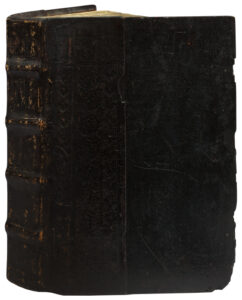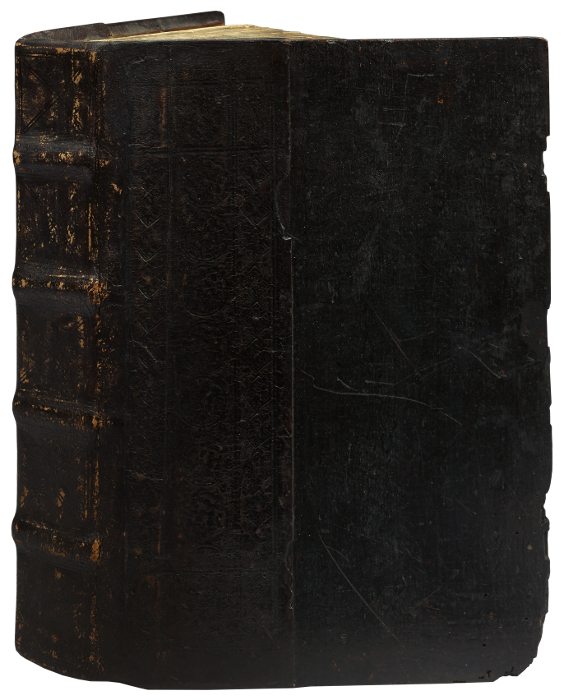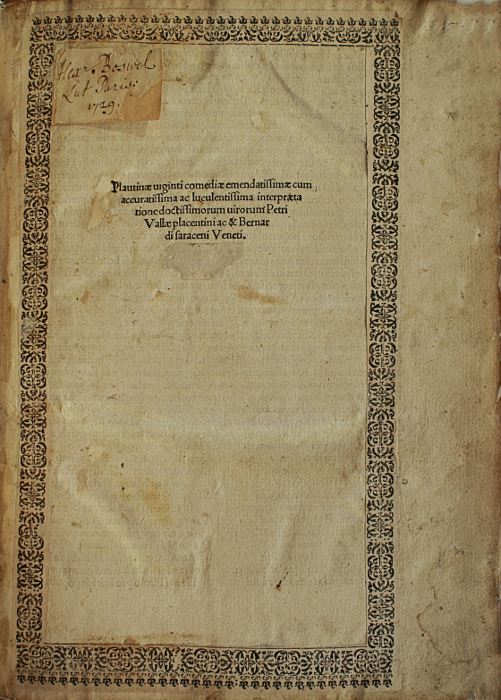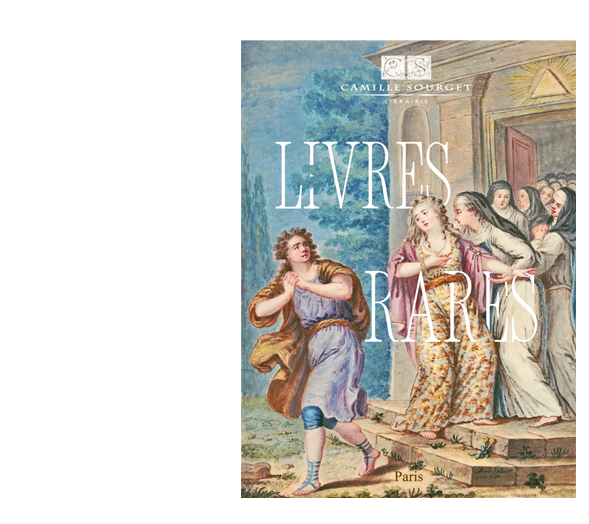PLAUTE. Titius Maccius (254-184 av. J.-C.) Comoediae. Plautinae viginti comoediae emendatissimae, cum…, interpretatione…Petri Vallae Placentini ac & Bernardi Saraceni Veneti. Impressum Venetiis, per Simomem papiensem dictum Bevilaqua… Venice, Simon Bevilaqua, September 17th 1499.
2 parts bound in 1 folio volume [310 x 223 mm] of : I/ (92) ll. ; II/ (6) ll., (250), complete ; signature A-F that is to say a total of 348 leaves. Hain only mentions 346 ll. by mistake. Greek and Roman characters, wood-engraved printing mark, initials enhanced with ink in the first quires. An engraved border framing the title has been added later. Half blind-stamped calf over wooden boards, spine ribbed, sprinkled edges. Contemporary binding.
First incunabula edition of Plaute’s Comedies, “The admirable Plaute” according to Varron, with the famous comments by Valla, “who, with Poggio, contributed the most to the renewal of antique literature.” Goff. P-784; HC 13082; Polain B 3198; BMC V 523; Brunet, IV, 706.
Laurent Valla, “the greatest humanist from the first half of the 15th century” was born in Rome towards 1407. (Guilio Vallese). “Deeply convinced of the superiority of antique culture which was then renewed, in which he saw an incomparable regeneration seed, Valla, in order to defend it, didn’t hesitated in taking the chance of a sentence in an Inquisition court . Like other humanists of this time, he was claiming that he was coming from the antique rationalist moral passed on through the books of Wisdom, of which the Middle-Ages had impoverished or lost its meaning itself.”
This edition is very sought-after for the comments by Valla that are published here for the first time and many copies are in American libraries including 2 in Harvard and 2 at the Library of Congress, but rarely in their unrestored contemporary binding.
Twenty one comedies by Plaute reached us. He essentially adapted to Latinity the works from Greek new comedy; “but even if we didn’t knew, from antique sources, the liberties Plaute was taking adapting his comedies to the Roman taste, we would only have to read his plays to get an idea of his talent and his culture. But Plaute’s real master-piece is his language, and this is where he is inimitable. He knew how to make use of all the resources of Latin, his language is rich, living, and popular while having an original character, it allows him to express without any trace of crudeness vulgar ideas from vulgar people. A grammarian wrote: if Muses would have wanted to speak Latin, they would have uses Plaute’s language. […] The situations, the plots and the characters of Plaute’s work enjoyed the favor of all the periods and we find them again in an infinite number of versions, always funny, in Boccaccio as in ‘Ariosto’ and ‘Aretino’, in Shakespeare as in Molière.” Fausto Codino.
“Plaute ignored decorum and mediocrity”. La Fontaine.
A superb extremely wide-margin copy, with many handwritten humanist comments in the margin from the Renaissance, preserved in its pure contemporary half blind-stamped calf over wooden boards, coming from Alexandre Boswell’s collection, Paris, 1729 ; exceptional condition.
See less information



